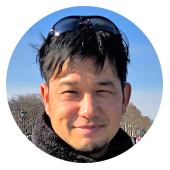Obayashi's directing style
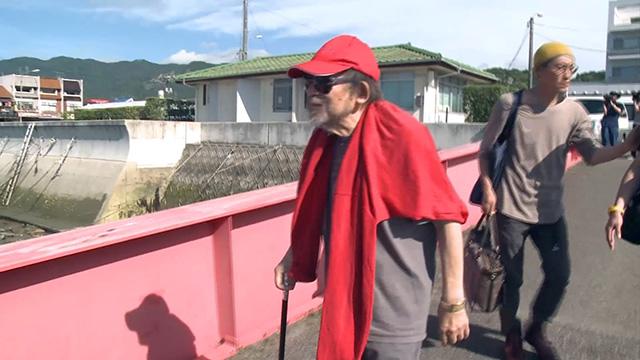
Movie Director Nobuhiko Obayashi began shooting his 44th film on July 2nd. The production is taking place in Hiroshima Prefecture's Onomichi, the region where he spent his early years. The 80 year old has a unique directing style.
"I think you've all read the script carefully. But as always, you should expect that everything can change once you're on the set. Forget everything you've learned until now. I'll explain the new story," Obayashi tells the cast and crew one morning.
Obayashi likes to incorporate ideas that come to him on set. Last-minute script changes are normal. And the actors don't get to rehearse their scenes. After last-minute changes, a young actor, Yoshihiko Hosoda, jumps into the sea. "All good. It was wonderful! Thank you," says Obayshi, satisfied.
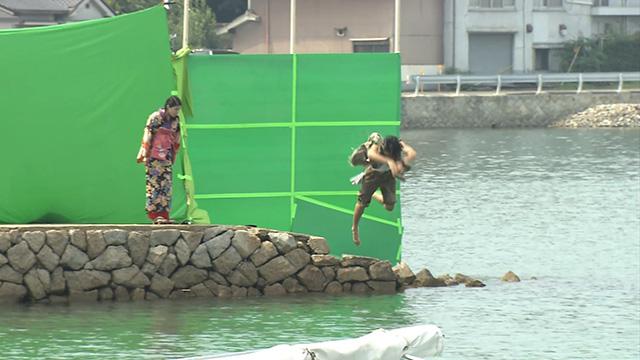
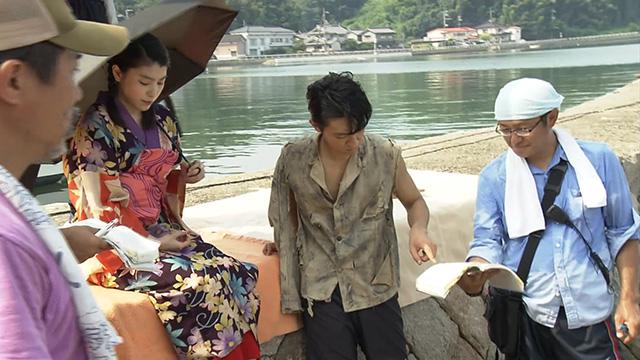
"Obayashi tells us not to make up our minds in advance, or put labels on things. I think it’s amazing. His unique approach is built on the idea that acting is very much like life itself -- you only get one chance, one take... with no rehearsals," says Hosoda, who plays one of the protagonists.
Obayashi's past
As a student with dreams of becoming a film director, I used to make my own films using an 8mm camera in the 1990s. Obayashi was the film director I admired. I met him for the first time a year ago, after he was diagnosed with cancer.
As we walked through a park in his neighborhood while I interviewed him, he said, "Everything I see all around me has started looking as if it has a soul." Wanting to find out what he meant, I immersed myself on the set to find out more about Obayashi's philosophy and the message he's hoping to convey through his latest film.

Obayashi began his career in advertising. After making a name for himself, he switched to film directing at the age of 39. His reputation as a maverick, and his refreshing approach to filmmaking, soon won him many fans. Obayashi became popular with his movies depicting the various trials and tribulations of adolescence, filmed in his hometown Onomichi. In recent years, he has released avant-garde films on war, harnessing digital technology.
His latest movie
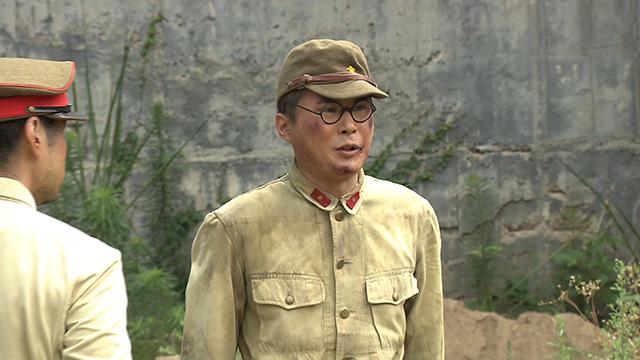
Obayashi’s current project tells the story of 3 young men in contemporary Japan who are sent back in time while watching a war movie. The protagonists are forced to experience different wars fought by Japan over the last 150 years.
"Humans have the power to fight wars, but they may also have the power to create peace -- at least I think they should. Movies are powerful, beautiful things, and I believe that making movies can bring about the conditions for peace in the future," Obayashi says. "This film is not an old man's nostalgic take on the bygone days of war. It's meant for the young and future generations, to get them to learn about the past for their own sake."
Battle against cancer
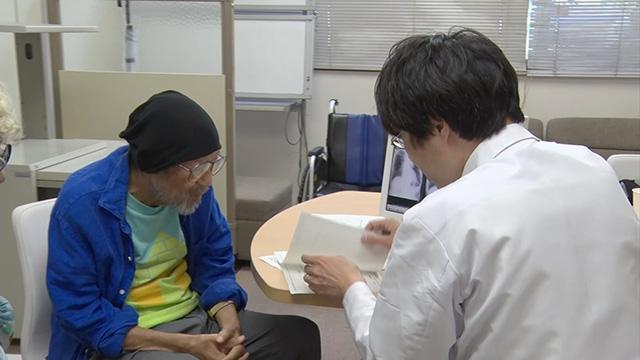
For Obayashi, being on set while battling cancer is a challenge. Two years ago, he was diagnosed with stage-4 lung cancer, and was told he had just 3 months to live. He's managed to survive thanks to chemotherapy and radiation treatment.
Obayashi has to go to the hospital every 2 weeks, even while shooting the new movie. At his hospital appointment in early August, the doctor has some bad news. "Tumor markers are increasing,” the doctor says.
His cancer is getting worse. Before Obayashi was diagnosed with the illness, he would say, "I make my movies on my feet," meaning he would walk around on the set and communicate directly with the crew and cast while filming. During his battle against cancer, his weight dropped nearly 30 kilograms, and his height shrank 20 centimeters. As his physical strength declined, it became difficult for him to walk freely.
Philosophy of Obayashi
This summer, Obayashi kept filming despite a severe heat wave. On one of the days, he is unhappy with the actors’ performances. In the scene, the main characters wander into Japan at the end of World War 2. They have to train for a suicide mission against enemy tanks. They use a handcart to simulate the tank, and a lunchbox instead of a land mine.
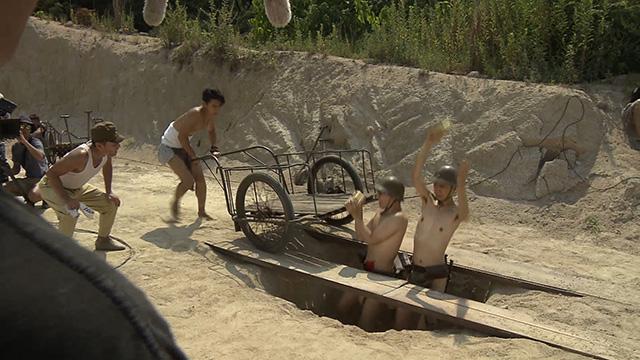
The script only says, "The drill is repeated over and over at high speed." The scene is meant to illustrate the absurdity of war and how young lives were sacrificed in vain.
"Use a land mine," an actor says. However, the other young actors are confused. They lack confidence, and aren’t sure how to proceed. "I don’t understand," one of them says. "Do I open the lunchbox after I come out?"
To avoid the sun's rays and heat, Obayashi is sitting under a parasol far away from the actors and camera crew. Seeing the confusion, he asks the actor whether he understands what to do. "I’m receiving instructions now," the actor replies. "I’m telling you now, so just listen. If you still don’t get it, then I'm coming over.” Obayashi responds. He stands up and walks toward them slowly,
"As I've said many times, I’m only going to explain the philosophy. The rest is up to you. I’m not going to tell you how you should act. You need to think about it yourselves," Obayashi says. "You decide. Not me. It's up to you. That's what making movies is all about.”

Obayashi doesn’t give specific instructions about acting. He doesn't want actors to perform. He wants them to embody their roles. Such is his recipe to captivate the audience.
With his illness gradually making it difficult for him to move around on the set, Obayashi can't help but show his frustration for not being able to convey what he wants directly toward the cast and crew. I understand his frustration. Even though I'm a documentary cameraman, an intractable disease affecting my eyesight has worsened for the past few years. I've also been frustrated while out shooting and reporting, and even in daily life.
How would you live if you had to deal with something that you couldn't change by yourself? Despite his fate, Obayashi continues to make films, as he wants to give life to what wells up from the bottom of his heart. And he wants the power of film to continue into the future.
The last day in Onomichi
It’s August 16th, the last day of filming in Onomichi. Obayashi is shooting a scene in which a young Chinese girl loses her life during a battle. The final section of filming begins at 2 AM after 16 hours of work. Everyone is exhausted.
"Action!"
The last cut involves a blood spatter. The blood bursts out of the girl's mouth, filling the entire screen. It's meant to underline the cruelty of war. The surreal visual effect and camera angle are typical of Obayashi's style.
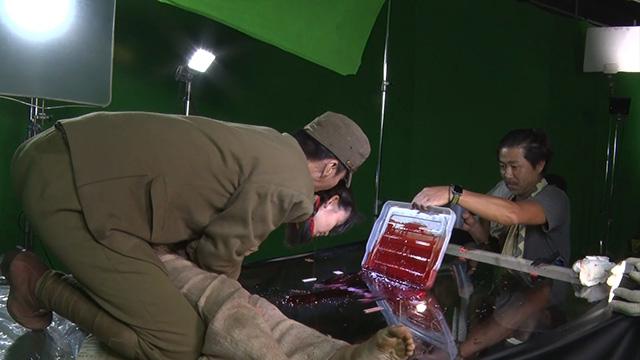

"Cut! Yes, okay!"
After 8 takes, Obayashi is finally satisfied with the scene. It's 4 AM on August 17.

The 7 weeks of shooting come to an end. Obayashi shares his final thoughts with the cast and crew -- his message for the younger generation he is working with.
"My condition really shouldn't have allowed me to be on the set, but yet I was here. Thank you for letting me be here. I kept it to myself, but I felt extremely grateful for this opportunity. It’s been a blessing. Thank you for your hard work, really, thank you," Obayashi says. "You all represent my future, so keep at it."
Filming until the end
"It's my destiny to make this movie and convey its message to young people," Obayashi says after returning from Onomichi to Tokyo. "I have to stay alive, no matter what. I'm just too busy to die. I’m going to keep pushing myself hard and keep on living. I won’t give up easily." Spending the whole summer with Obayashi, who refuses to give up making films until he dies, prompted me to consider my own life.
While continuing treatment against cancer, Obayashi will now spend 6 months editing to complete his film. His latest, and hopefully not final, opus will hit theaters next spring.
Whether you agree with his movies or not, Obayashi's strong will and way of life are an inspiration for everyone.
